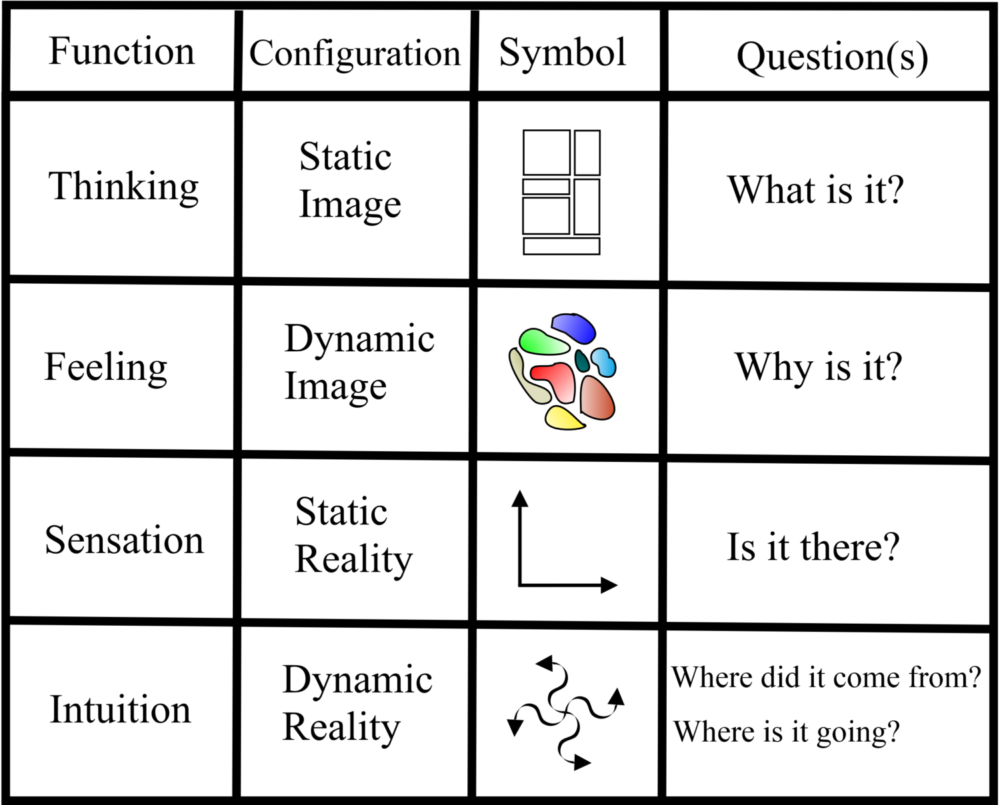






A Brief Description of Jung’s Eight Function-Attitude Types
Extraverted Sensation
This type is concretely grounded in the here and now. They are objective, matter-of-fact, and take reality for face value. For these types, what you see is what you get.
Introverted Sensation
This type deals primarily with subjective participation and is primarily focused on comparing past experiences with present ones. In this way, they usually view the present in terms of the past. This type can come across as self-absorbed.
Extraverted Intuition
In its extraverted configuration, expectations are directed toward the object and the possible future. Expectation and suggestion figure prominently in this type. The downside about extraverted intuition is that it is so busy trying to predict new possibilities that is often fails to make any real connection to the present. Extraverted intuitive seem to never tire of novelty.
Introverted Intuition
Because this function deals with unconscious contents, it is difficult to describe and measure. This type focuses on inner possibilities that subjectively arise from the unconscious. Prophets and visionaries usually fall into this category. This type often has a difficult time sorting through the countless hunches and ideas that surface.
Extraverted Thinking
This type tends to arrange ideas into a conceptual relationship, usually a linear one. For them, conceptual thinking is central. They primarily deal in objective facts of the external world. Modern scientific approaches are rooted in extraverted sensation and thinking.
Introverted Thinking
This type is primarily focused on internal ideas. Their primary criterion is a subjective one, thus, their thinking is less conceptually constrained than the extraverted thinking type. They have no problem thinking through an image. Since the accent does not rest on the external collective, an internal idea can be just as true as an external fact (e.g., The sky is blue.)
Extraverted Feeling
Extraverted feeling is about objective values, that is to say, the values that are found in the collective sphere. This type aspires to harmonize with the external world. How one feels about an event is more important than logical criteria. Extraverted feeling types usually have a very well-developed persona.
Introverted Feeling
The term “still waters run deep” tends to epitomize this type. Subjective feelings are primary and abide deeply by their individual values and they leave little room for compromise in this regard.
Finally, there are a few additional things to consider . . .
- The main function (e.g., thinking) is directly supported by an auxiliary function which helps guide the personality’s course like the rudder of a ship.
- If the superior function is judging, the auxiliary function will be perceiving. This is generally implied within Jung’s type theory but it is not a settled issue.
- Typology is not an exact science.
- The four functions could be viewed as snapshots of reality in static and dynamic configurations.
- Although psychometric instruments are valuable, there is no substitute for self-knowledge. Most people can tell what type they are if they honestly assess themselves and understand the basic typological criteria.
References
Jung, C. G. (1971). Psychological types. In H. Read, M. Fordham, G. Adler & W. McGuire (Eds.), The collected works of C.G. Jung (R. F. C. Hull, Trans.) (2nd ed., Vol. 6). Princeton, NJ: Princeton University Press. (original work published in 1921)
Jung, C. G. (1975). A psychological approach to the dogma of the trinity. In H. Read, M. Fordham, G. Adler & W. McGuire (Eds.), The collected works of C.G. Jung (R. F. C. Hull, Trans.) (2nd ed., Vol. 11). Princeton, NJ: Princeton University Press. (original work published in 1948)
Jung, C. G. (1984). Dream analysis: Notes on the seminar given in 1928-1930 by C. G. Jung (W. McGuire, Ed.). Princeton, NJ: Princeton University Press. (Original work published 1938)
Jung, C. G. (2012). Introduction to Jungian psychology: Notes on the seminar on analytical psychology given in 1925. Princeton, NJ: Princeton University Press. (Original work published 1989)
Marshall, I. (1968). The four functions: A conceptual analysis. Journal of Analytical Psychology, 13 (1), 1-32.